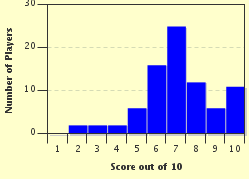Quiz Answer Key and Fun Facts
1. Which of the following is true about asthma?
2. Asthma can be generally classified into mild, moderate and severe.
3. In which of the following situations are you likely to get asthma?
4. Acute severe asthma is medically termed as which of these?
5. Which of the following MAY NOT commonly be a symptom of asthma?
6. In some asthmatic patients, the drop in systolic blood pressure is more than 10 mm Hg during inspiration. This is called what?
7. Which of the following is one of the main investigations to diagnose asthma?
8. Which of the following WOULD NOT be advice that you give to a patient with asthma?
9. Which of the following is a beta agonist drug, that is most common in nebulizers, and used to combat asthma?
10. The drug zafirlukast is used in the long term treatment of asthma. What drug group does it belong to?
Source: Author
Saleo
This quiz was reviewed by FunTrivia editor
rossian before going online.
Any errors found in FunTrivia content are routinely corrected through our feedback system.


